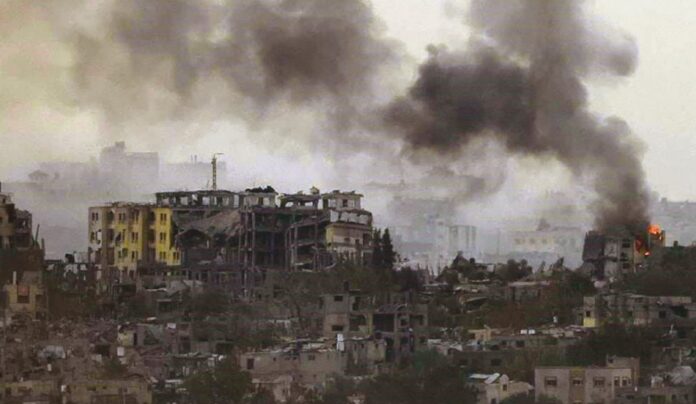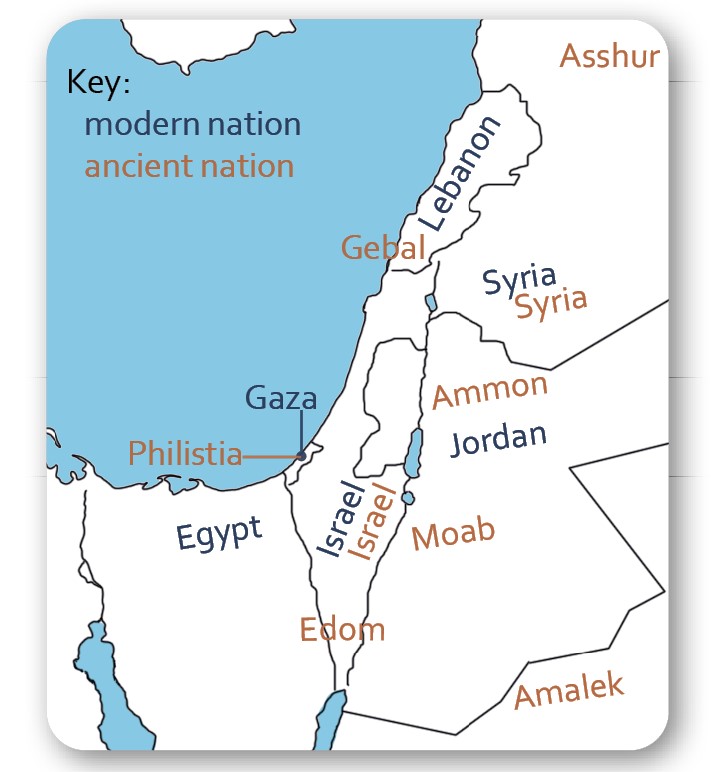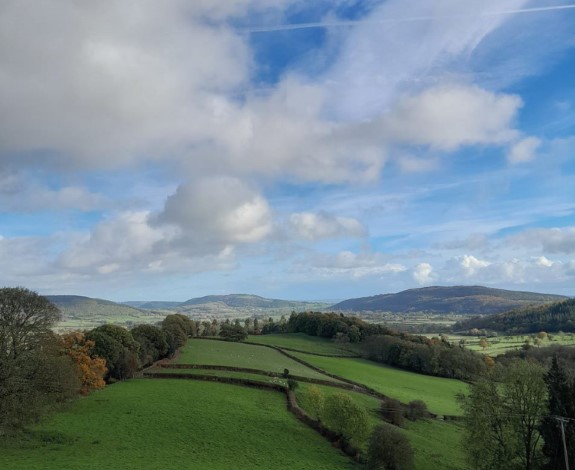It may come as a surprise that the current hostilities between Israel and its neighbours were foretold in the Bible.
For instance, Psalm 83 is a plea to God by its Jewish writer because of the threat to his country by a range of neighbouring nations. If you compare a map of the ancient nations described in the Psalm, you’ll see a remarkable correspondence to the enemies of the modern nation of Israel.
Psalm 83 begins:
O God, do not keep silence; do not hold your peace or be still, O God! For behold, your enemies make an uproar; those who hate you have raised their heads. They lay crafty plans against your people; they consult together against your treasured ones. They say, “Come, let us wipe them out as a nation; let the name of Israel be remembered no more!” (vs. 1–4).*
Implacable Hatred
This animosity is readily seen in the attitude of Israel’s principal enemies. For example, Hezbollah is the political party and paramilitary group based in Lebanon. Its manifesto states:
The Necessity for the Destruction of Israel
We see in Israel the vanguard of the United States in our Islamic world. It is the hated enemy that must be fought until the hated ones get what they deserve. This enemy is the greatest danger to our future generations and to the destiny of our lands…
Hamas is the pol-itical and military organisation which governs the Gaza Strip. Its covenant states:
Israel will exist and will continue to exist until Islam will obliterate it, just as it obliterated others before it.
The Jihad for the liberation of Palestine is an individual duty.
Despite desperate efforts by the United Nations and the international community, the deadly hostility between Israel and its opponents shows no sign of abating. Bible readers are not surprised at this. In fact, we know that the situation will get much worse before it is resolved.
If you read to the end of Psalm 83 you will see the Psalmist’s confidence that Israel will finally be delivered from its enemies—not by its own military prowess, or for its own glory, but ‘that they may know that you alone, whose name is the Lord, are the Most High over all the earth’ (v. 18).
Israel Facing Catastrophe
The prophecy of Zechariah provides some more detail:
Behold, a day is coming for the Lord, when the spoil taken from you will be divided in your midst. For I will gather all the nations against Jerusalem to battle, and the city shall be taken and the houses plundered and the women raped. Half of the city shall go out into exile, but the rest of the people shall not be cut off from the city (Zechariah 14:1-2).
The attackers this time will not be one nation only, but all nations will be represented in the invading force, with considerable initial success. Israel’s very existence will seem threatened, as though its enemies are about to triumph. But the massed forces will face unforeseen opposition, as the following verse shows: ‘Then the Lord will go out and fight against those nations as when he fights on a day of battle’ (v. 3).
Again we see that Israel will finally be delivered—not by its own military efforts and not for its own glory, but by God Himself. What does Zechariah mean when he refers to God fighting on a day of battle? Here are some past occasions:
- When God brought the nation of Israel into the Promised Land, they fought with its previous inhabitants. There was a pivotal battle: ‘And as they fled before Israel, while they were going down the ascent of Beth-horon, the Lord threw down large stones from heaven on them as far as Azekah, and they died. There were more who died because of the hailstones than the sons of Israel killed with the sword’ (Joshua 10:11).
- Later, Israel was attacked by various enemies. One of them was Jabin king of Canaan. Through the prophetess Deborah God instructed the commander of Israel’s army: ‘Go, gather your men at Mount Tabor, taking 10,000 from the people of Naphtali and the people of Zebulun. And I will draw out Sisera, the general of Jabin’s army, to meet you by the river Kishon with his chariots and his troops, and I will give him into your hand’ (Judges 4:6–7). The account goes on to describe the Israelites’ victory over Jabin’s army. Deborah’s song of triumph reveals how God fought for them: ‘The torrent Kishon swept them away, the ancient torrent, the torrent Kishon’ (Judges 5:21).
- One of the deadliest threats the Israelites faced was the invasion of Assyria, which destroyed the northern part of the nation and laid siege to Jerusalem. King Hezekiah sought help from God. ‘And that night the angel of the Lord went out and struck down 185,000 in the camp of the Assyrians. And when people arose early in the morning, behold, these were all dead bodies’ (2 Kings 19:35).
This is only a selection of the ways in which God has changed the outcomes of conflicts in favour of the Jews. Open the Bible and see how many more you can find.
Divine Intervention
Zechariah’s prophecy continues:
On that day his feet shall stand on the Mount of Olives that lies before Jerusalem on the east, and the Mount of Olives shall be split in two from east to west by a very wide valley, so that one half of the Mount shall move northwards, and the other half southwards (Zechariah 14:4).
This is a clear reference to the return of Jesus Christ to the very place from which he was taken into heaven 2000 years ago (Acts 1:11). God will intervene at the very point of catastrophe in the Middle East crisis, by means of sending His Son.
Zechariah 14 describes the cataclysmic events surrounding the return of Christ, and the final establishment of God’s Kingdom on earth: ‘And the Lord will be king over all the earth. On that day the Lord will be one and his name one’ (v. 9).
Whether the present conflict will escalate into the situation described in Zechariah, or whether it is like the preliminary rumbles of a volcano warning of the main event, we dare not predict, but the final outcome is certain. The Middle East conflict will be resolved. It will be achieved not by human efforts, but it will be imposed by God. Israel, its neighbours, and the whole earth will at last enjoy true and lasting peace: ‘For the earth will be filled with the knowledge of the glory of the Lord as the waters cover the sea’ (Habakkuk 2:14).
Peter Banyard




